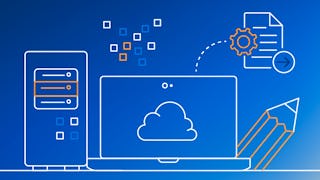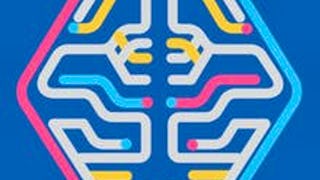Filter by
SubjectRequired
LanguageRequired
The language used throughout the course, in both instruction and assessments.
Learning ProductRequired
LevelRequired
DurationRequired
SkillsRequired
SubtitlesRequired
EducatorRequired
Explore the Nervous System Course Catalog

Duke University
Skills you'll gain: Spatial Analysis, Neurology, Human Learning, Experimentation, Laboratory Research, Physics, Biology, General Science and Research, Magnetic Resonance Imaging
University of Minnesota
Skills you'll gain: Preventative Care, Chronic Diseases, Health Care, Stress Management, Behavioral Health, Personal Development, Physical Therapy, Patient Education and Support, Health Assessment, Resilience, Mindfulness, Systems Thinking, Neurology
 Status: Free Trial
Status: Free TrialAmazon Web Services
Skills you'll gain: AWS Identity and Access Management (IAM), Amazon CloudWatch, Amazon DynamoDB, Amazon Web Services, Cloud Computing, Amazon S3, Scalability, Amazon Elastic Compute Cloud, Cloud Security, Serverless Computing, Cloud Storage, Databases, Virtual Private Networks (VPN), Load Balancing, General Networking, Containerization
 Status: Free Trial
Status: Free TrialSkills you'll gain: Feature Engineering, MLOps (Machine Learning Operations), Prompt Engineering, Google Cloud Platform, Generative AI, Tensorflow, Keras (Neural Network Library), Apache Airflow, Cloud Infrastructure, CI/CD, Artificial Intelligence and Machine Learning (AI/ML), Data Pipelines, Dataflow, Systems Design, Cloud Platforms, Data Management, Data Governance, Hybrid Cloud Computing, Workflow Management, Application Deployment
 Status: Free Trial
Status: Free TrialSkills you'll gain: Bash (Scripting Language), Unit Testing, Scripting, Unix Shell, Shell Script, Linux Commands, Test Driven Development (TDD), Unix Commands, Unix, Scripting Languages, Development Environment, Operating Systems, Command-Line Interface, File Management, OS Process Management, Automation, Debugging, Python Programming

University of Toronto
Skills you'll gain: Programming Principles, Debugging, Software Documentation, Python Programming, Computer Programming, Program Development, Integrated Development Environments, Data Structures, File Management
 Status: Free Trial
Status: Free TrialUniversity of Washington
Skills you'll gain: Public Speaking, Persuasive Communication, Presentations, Verbal Communication Skills, Microsoft PowerPoint, Oral Expression, Communication, Storytelling, Critical Thinking, Motivational Skills, Constructive Feedback, Performing Arts, Concision, Drive Engagement, Communication Strategies, Writing, Target Audience, Non-Verbal Communication, Problem Solving, Composure
 Status: Free Trial
Status: Free TrialSkills you'll gain: Medical Terminology, Anatomy, Pathology, Medical Records, Health Information Management and Medical Records, Health Care, Biology, Nutrition and Diet, Molecular, Cellular, and Microbiology, Life Sciences

Yale University
Skills you'll gain: Student Support and Services, Emotional Intelligence, Working With Children, School Counseling, Personal Development, Stress Management, Classroom Management, Cultural Responsiveness, Empathy, Self-Awareness, Resilience, Relationship Building

University of Virginia
Skills you'll gain: Branding, Brand Strategy, Brand Management, Personal Attributes, Digital Assets, Social Media, Personally Identifiable Information, Computer Security Awareness Training, Self-Awareness, Social Media Strategy, Information Privacy, Constructive Feedback

The University of Sydney
Skills you'll gain: Mental Health, Stress Management, Community Mental Health Services, Mindfulness, Mental Health Diseases and Disorders, Psychiatry, Positivity, Rehabilitation, Resilience, Behavioral Health, Clinical Psychology, Mental Health Therapies, Psychotherapy, Personal Development, Mental and Behavioral Health, Creativity, Self-Awareness, Occupational Therapy, Empowerment, Physical Therapy
 Status: Free Trial
Status: Free TrialSkills you'll gain: Incident Response, Computer Security Incident Management, Intrusion Detection and Prevention, Event Monitoring, Threat Detection, Incident Management, Security Information and Event Management (SIEM), Cybersecurity, Cyber Threat Hunting, Continuous Monitoring, Network Security, Network Monitoring, Document Management, Network Analysis, Splunk, Technical Documentation, TCP/IP, Network Protocols
Nervous System learners also search
In summary, here are 10 of our most popular nervous system courses
- The Brain and Space: Duke University
- Preventing Chronic Pain: A Human Systems Approach: University of Minnesota
- AWS Cloud Technical Essentials: Amazon Web Services
- Preparing for Google Cloud Certification: Machine Learning Engineer: Google Cloud
- Using Python to Interact with the Operating System: Google
- Learn to Program: The Fundamentals: University of Toronto
- Dynamic Public Speaking: University of Washington
- Medical Terminology and the Human Body Fundamentals: MedCerts
- Managing Emotions in Times of Uncertainty & Stress: Yale University
- Introduction to Personal Branding: University of Virginia











